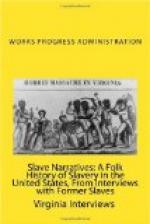“In those days they’d all kinds of work by hand on the farm. No Madam, no cotton to speak of, or tobacco then. Just farmin’ corn, hogs, wheat fruit,—like here. Yes Madam, that was all on John Beck’s farm except the flax and the big wooley sheep. Plenty of nice clean flax-cloth suits we all had.
“Beck wasn’t so good—but we had enough to eat, wear, and could have our Saturday afternoon to go to town, and Sunday for church. We sho did have church, large meetin’—camp meetin’—with lot of singin’ an shoutin’ and it was fine! Nevah was no singer, but I was a good dancer in my day, yes—yes Madam I were a good dancer. I went to dances and to church with my folks. My father played a violin. He played well, so did my brother, but I never did play or sing. Mammy sang a lot when she was spinning and weaving. She sing an’ that big wheel a turnin.’
“When I can read my title clear,
Up Yonder, Up Yonder, Up Yonder!
and another of her spinnin’ songs was a humin:—
“The Promise of God Salvation free to give...”
“Besides helpin’ on the farm, father was ferryman on the Yadkin River for Beck. He had a boat for hire. Sometimes passengers would want to go a mile, sometimes 30. Father died at thirty-five. He played the violin fine. My brother played for dances, and he used to sing lots of songs:—
“Ol’ Aunt Katy, fine ol’
soul,
She’s beatin’ her batter,
In a brand new bowl...
—that was a fetchin’ tune, but you see I can’t even carry it. Maybe I could think up the words of a lot of those ol’ tunes but they ought to pay well for them, for they make money out of them. I liked to go to church and to dances both. For a big church to sing I like ’Nearer My God to Thee’—there isn’t anything so good for a big crowd to sing out big!
“Father died when he was thirty-five of typhoid. We all had to work hard. I came up here in 1892—and I don’t know why I should have, for Winston-Salem was a big place. I’ve worked on farm and roads. My wife died ten years ago. We adopted a girl in Tennennesee years ago, and she takes a care of me now. She was always good to us—a good girl. Yes, Madam.”
Wade Glenn proved to be not nearly so interesting as his appearance promised. He is short; wears gold rimmed glasses; a Southern Colonel’s Mustache and Goatee—and capitals are need to describe the style! He had his comical-serious little countenance topped off with a soft felt hat worn at the most rakish angle. He can’t carry a tune, and really is not musical. His adopted daughter with whom he lives is rated the town’s best colored cook.
Ohio Guide, Special
Ex-Slave Stories
August 16, 1937
DAVID A. HALL
“I was born at Goldsboro, N.C., July 25, 1847. I never knew who owned my father, but my mother’s master’s name was Lifich Pamer. My mother did not live on the plantation but had a little cabin in town. You see, she worked as a cook in the hotel and her master wanted her to live close to her work. I was born in the cabin in town.




